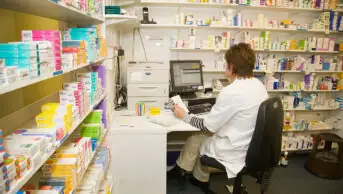
Shutterstock.com/The Pharmaceutical Journal
Starting in the autumn of 2023, 15 trainee pharmacists will spend 13 weeks of their foundation year working within health and justice sites. They will be hosted by either an NHS hospital trust or community pharmacy where they will spend the rest of their foundation year.
These unique patient-facing placements will enable trainees to work as part of the multidisciplinary healthcare team, providing services to prisoners at the same time as completing the General Pharmaceutical Council initial education and training learning standards.
The overall purpose of NHS England-commissioned healthcare in prisons, including pharmacy services and medicines optimisation, is to provide an excellent, safe and effective service to all people in custody equivalent to that offered in the community.
People in custody are able to engage with services they may not have accessed in the community to improve their health and wellbeing, such as those to aid recovery from substance misuse, mental health problems, management of long-term conditions and access to public health interventions to prevent disease and illness. Pharmacy teams in prisons provide the leadership and expertise for patients and staff to deliver clinical pharmacy and medicines access and supply.
Prison pharmacy practice combines roles that are found in GP practices, care homes, community pharmacy and hospital practice. The placements have been designed to enable trainees to build on the skills and knowledge they have developed at their host organisation, hone them in a different sector and be able to use them repeatedly and reliably.
Furthermore, the placements will see trainees develop broader skills in an environment where medicines safety, and service delivery is complex, allowing them to be more flexible, adaptable and prepared for future practice.
Completion of a health and justice placement will open doors in terms of potential future recruitment
Trainees will complete some tasks that are unique to the health and justice sector, including implementation strategies for risk reduction owing to harm from misuse of prescribed medicines and monitoring for withdrawal symptoms and signs of potential overdose or continued use of illicit drugs. However, most tasks trainees will complete will be similar to those that would be undertaken in other sectors, such as medicines reconciliation.
Once qualified, completion of a health and justice placement will open doors in terms of potential future recruitment, particularly for those looking at portfolio careers.
For the wider health system, it is hoped that embedding trainee pharmacists into health and justice will promote networking and engagement between pharmacy teams in different sectors. This is with the aim of supporting improved transfer of care and access to medicines and pharmacy services for health and justice patients.
Pharmacists in health and justice will act as a designated supervisor for the trainee in their site. The role of designated supervisor will provide evidence toward credentialing as a core advanced pharmacist, specifically for two of the five domains needed for the credentialing: ‘leadership and management’ and ‘education’.
Barriers that have needed addressing in developing these placements include the availability of a pharmacist to act as a designated supervisor according to General Pharmaceutical Council requirements and developing contingency plans when there are changes in availability. Additionally, trainees are required to have prison clearance before they can work within the prison. Employers have been asked to start this process as early as possible. This can sometimes take several months to complete.
Expansion of trainee pharmacists into health and justice settings is part of the NHS England health and justice inclusive workforce programme, which aims “to improve the recruitment and retention of a larger, more diverse, inclusive and representative workforce for all health and justice services and programmes”.
During promotion of these placements to pharmacy students, a high level of interest was shown, with 94% of available placement opportunities filled for 2023/2024 and the number of placements available to preference on Oriel will increase to 26 in 2024/2025.
For more information, a recording of a webinar recorded with the British Pharmaceutical Students’ Association is available to watch.
Acknowledgements
We would like to thank the pharmacy employers, health and justice pharmacy teams, NHS England workforce, training and education directorate, NHS England health and justice commissioners and schools of pharmacy for their support with the expansion of trainee pharmacists in health and justice.
Daniel Hill and Rhusubh Katkoria, senior health and justice pharmacy workforce development leads at NHS England


